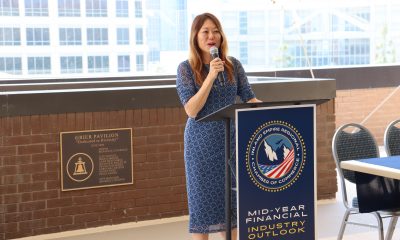Business
Tips on Accessing Capital as an Under-resourced Small Business Owner

Interview with Peter E. Jackson, MBA, Vice President, Sr. Business Consultant at J.P. Morgan Chase
By Josaline Cuesta, California Program Director, Small Business Majority
Entrepreneurship is essential to a thriving and equitable economy. Yet, too many of our smallest businesses—especially those owned by people of color, women, rural business owners, and other under-resourced communities—face significant hurdles in accessing capital from banks and other traditional financial institutions.
Small Business Majority prides itself on partnering with experts in the field to mitigate the unnecessary impacts of inequitable access to capital and help to break down systematic barriers.
Peter E. Jackson, MBA is Vice President, Sr. Business Consultant at J.P. Morgan Chase. His work in California has been integral to creating pathways for minority and women entrepreneurs to access capital successfully. I sat down with Peter for a Q&A to discuss his experiences, share his expertise and tips, and learn more about expanded opportunities for capital in a unique community.
Do you believe there is a barrier to accessing responsible capital for small business owners? If yes, do you believe that a certain group of small business owners are more susceptible to experiencing challenges? Why?
From where I sit, one of the biggest hurdles facing minority small businesses is access to financial education. Many Black and Latino business owners we work with through the Chase mentorship program, believe it or not, cite access to education as their top need, e.g., understanding working capital, credit readiness, financial planning, managing debt and cash flow, etc. Working knowledge of these principles is the foundation of building a small business. That means having your bookkeeping and financial operations to help you make your best case when seeking funding/capital from any lender. Not having this in order may delay any financing for your business. There are also questions to ask yourself, e.g. ‘Am I in a healthy financial position to pay back a loan or is a bank loan the right financing option for my business needs at this time?’ This is where a banking relationship or banker can come in handy.
Often, minority entrepreneurs may not have had the best relationship with a bank or may not have had a parent or close individual to seek guidance from related to entrepreneurship – the list goes on. The pandemic exacerbated many of the underlying racial disparities that already existed in the U.S., including the banking system. As a firm, we recognize these challenges and do everything we can to address them.
In 2020, JPMorgan Chase announced a $30 billion racial equity commitment to create an inclusive economic recovery and help Black and Latino small businesses, families, and local communities create and sustain generational wealth. We’re creating the infrastructure to help more minority-owned businesses grow and recover through new programs, products, and hiring. This service is free, and business owners do not have to be Chase customers to receive coaching and mentorship.
Information about the JP Morgan Chase Minority Owned – Business Program is available at: https://www.chase.com/es/business/minority-businesses
What stories have you heard about the ease of accessing capital for small business owners? Can you please share a few typical challenges and some success stories? Did any success stories involve innovation? Did owners have to think outside the box to gain continued access to capital?
Yes, thinking out of the box is an everyday part of what we as Sr. Business Consultants do. Every business owner comes from a different place financially and operates their business differently. An example of this was a local smoothie bar owned by a Latina entrepreneur in Fontana, California. I discussed her goals and challenges, and she needed to obtain a small working capital loan to hire a part-time employee to extend her business hours and add signage. I helped her calculate and understand her break-even to determine the right price she needed to charge for her product to be able to pay for an additional employee and add a sign to the front of her store. This was important because she established new sales goals to drive more revenue. Also, the loan underwriter could see her business now had sufficient income capacity to borrow and pay back a loan by charging enough to support the loan payment. Business owners often borrow without a plan to demonstrate they can repay the loan or without consulting their CPA to ensure they leave enough money in their business to borrow. Part of my role is to help small business owners understand their business finances and how to leverage them to scale and grow their businesses.
What are some ways to increase small business funding to expand access to capital?
From JPMorgan Chase’s standpoint, here’s what we are doing to expand access to capital for underrepresented communities. We have committed $396 million (page 23-25) in small business philanthropy to grow Black, Hispanic and women-owned small businesses and create a more inclusive recovery from the COVID-19 pandemic, including:
- ~$42.5 million to expand the Entrepreneurs of Color Fund (EOCF) in more U.S. cities, the program will offer low-cost loans and technical assistance to small businesses through LISC and CFDI network
- Philanthropic investments to build the capacity of diverse-led nonprofits across the globe and support the signature Ascend Program
- Policy solutions through the JPMorgan Chase Policy Center to improve U.S. Small Business Administration (SBA) program to better meet the needs of minority- and women-owned small businesses.
Within Business Banking, we plan to provide an additional 15,000 loans -totaling $2 billion- to small businesses in majority-Black, -Hispanic and Latino communities over the next five years. To further expand access to credit to minority business owners, we’re:
- Exploring targeted adjustments to how the firm evaluates credit applications
- Introducing new products, including a digital lending platform, to better support the needs of small Black, Hispanic and Latino-owned businesses seeking quick access to capital.
What are some of your recommended, trusted community resources or training opportunities within the Inland Empire that will help with understanding ways to access legitimate capital?
- Mentorship, dedicated coaching, and education are critical to helping people get credit ready. Look into Chase’s 1:1 coaching for minority entrepreneurs across 21 U.S. cities, where they work with a senior business consultant to help them scale. Visit www.chase.com/businessconsultant to learn more.
- Visit the Inland Empire Center for Entrepreneurship (IECE), an SBDC program within California State University, San Bernardino, which delivers a wide range of programs, technical assistance, and services to existing small business owners or aspiring entrepreneurs in the community. Every state has a small business development center offered through U.S. SBA and colleges/universities.
- Lastly, I think AmPac, UCR, and the University of La Verne also have some of the strongest community resources that speak to access to capital, readiness, training, grant programs, microfinancing, etc.
Peter will join other financial experts for a Small Business Majority hosted event on September 14, 5:30pm PT. “Breaking Barriers: Accessing capital as women business owners of color” is a free event to learn tips for remaining resilient in business and how to navigate non-predatory debt financing options that will help grow or strengthen your woman-owned small business to help build generational wealth.
Register for this event here: https://www.eventbrite.com/e/breaking-barriers-accessing-capital-as-women-business-owners-of-color-registration-393175316957
Business
Local Veteran and His Family Open New Graze Craze Charcuterie Business in Murrieta, California

Southern California wine country gets another stylish culinary option, offering beautifully designed, hand-crafted grazing boards and picnic boxes
Graze Craze® has opened a new location close to the wine country of Southern California, where its artfully arranged sweet and savory grazing boards and boxes create a perfect pairing for food lovers. Located at 24530 Village Walk Place, Suite C, in Village Walk Plaza, the 1,021-square-foot store is owned and operated by disabled veteran Chris Stout and his wife, Stephanie Stout, with assistance from their teenage children.
At Graze Craze, highly trained experts known as Grazologists™ skillfully design charcuterie arrangements that feature an assortment of fine ingredients perfect for grazing, like fresh fruits and vegetables, premium meats and cheeses, artisanal sweets, nuts, house-made jams and more.
Chris Stout enlisted in the U.S. Navy in 2001 and served several deployments before being discharged in 2012. Since then, he has worked as a field service engineer for an electronics company and in manufacturing sales. Stephanie Stout has a bachelor’s degree in business accounting from the University of Phoenix and worked for an insurance broker before the couple’s first child was born; she then devoted herself full-time to raising their three children, who are now in high school.
Graze Craze charcuterie boards offer something for every lifestyle, dietary preference or palate and are available in a variety of size options to cater to any occasion, big or small. They incorporate a medley of flavors, like the fan-favorite Gone Grazey board, a perfectly balanced mix of cured meats, premium cheeses, crackers, fresh produce, nuts and more. The Vegegrazian is impeccably designed with a plethora of fresh fruits and vegetables for anyone embracing a plant-based lifestyle. Those with an undeniable sweet tooth can enjoy the Sweet & Grazey, a hand-crafted board featuring an abundance of delectable desserts like chocolates and baked goods paired with sweet dips to accent the irresistible flavors.
New to the Graze Craze menu is the Brunch Board, a gourmet and innovative twist on any morning routine. Packed with breakfast meats, fresh fruits, eggs, pastries and more, this board is the perfect bagel-and-donut brunch alternative. Grazers can also tackle watch-party cravings with a seasonal Game Day Board, featuring a feast of
crowd-pleasing ingredients, like peppered salami, Italian prosciutto, goat cheese, cranberry walnut bread, raspberry jam and chocolate bark, to name a few.
The artisan-inspired charcuterie offerings at Graze Craze are available in different size options, from Char-Cutie-Cups and Picnic Boxes for nibbling to sharing-size boards with enough fresh food to feed a large party. The food displays are ideal for elevating work meetings, family gatherings, lavish events and more, while they also make for memorable gifts that impress.
Besides sharing the flavorful menu with the area, the Stouts are actively involved in numerous local school, business and community organizations. The pair supports the Murrieta Valley High School Marching Band Boosters and California High School Rodeo Association District 8, in addition to the Boy Scouts of America California Inland Empire Council and Friends of Temecula Troop 309, where Christopher Stout is a part of the adult leadership team. The couple has also worked with Homes For Our Troops, an impactful nonprofit organization that builds specially adapted homes for post-9/11 disabled veterans.
Graze Craze Murrieta is open for pick-up, catering and free local delivery Monday through Saturday from 9 a.m. to 6 p.m. and Sunday from 10 a.m. to 2 p.m. For more information, call 951-942-7293.
Business
Partners in Action: How CalOSBA is bridging the gap in funding and resources for Inland Empire small businesses

By Josaline Cuesta, California Program Director, Small Business Majority & IEBJ Content Contributor
For Tara Lynn Gray, Director of the California Office of the Small Business Advocate (CalOSBA), entrepreneurship has always been a core principle of her life. Her journey as an advocate for small businesses wasn’t built on textbooks, but on her family’s roots in small business ownership. As a young girl, she watched her grandmother empower and elevate Black women’s presences by styling their hair and instilling confidence in their personhood. She witnessed the direct impact of small businesses on community members in real time, and that’s always stayed with Tara.
As a key partner of Small Business Majority, she stands as a champion for the dreamers and risk-takers; the pillars of the communities across California and in the Inland Empire. I chatted with her to share more about her work at CalOSBA, what entrepreneurs can expect when they meet with a CalOSBA advisor, and the resources and community support available to help boost entrepreneurship in the Golden State.
Tell us about CalOSBA’s role in the small business community.
“California has the biggest small business community in the country, accounting for 4.1 million small businesses in 2023 alone. The overwhelming majority have no employees at all, except themselves, which means they don’t have a Board of Directors, expensive consultants, and they definitely don’t have lobbyists. I take my role as their advocate seriously, talking with and listening to small business owners from up and down the state. During the pandemic, we were under a very bright spotlight, administering nearly $5 billion in direct relief funding and we’re proud of the grant programs we still oversee. But that’s only a small part of what we do at CalOSBA.
My team connects small business owners to information and resources to help them get started, manage their business and, most importantly, to grow. If they’re looking for help, we want to be the first door they knock on. In addition, we offer Outsmart Disaster training, which focuses on how to mitigate risks associated with natural disasters and recovery avenues available to them. I always say the flagship of our office is our support for the statewide network of Small Business Centers, providing 1:1 business assistance and training for small business owners of all industries and in dozens of languages. In addition, supporting partners that deliver these services–all the federally funded centers like the Small Business Development Centers and the Women’s Business Centers but also Chambers of Commerce and other nonprofits—is a core function of my office. And a big source of pride because we know what a difference they make for their clients.”
What can small business owners expect from meeting with a California Small Business Center advisor?
“Small business owners can expect to meet someone who is fully invested in them. Our Centers cover the full spectrum of business needs, from writing a business plan and obtaining the right permits and licenses, to finding capital, planning a succession strategy and marketing to e-commerce. Our business advisors provide the experience and the objective perspective to help business owners optimize their best assets: ideas, energy, and ability to keep adapting and learning. And they do it because they love helping other people succeed. What’s more, business ownership can become isolating and it may be challenging for entrepreneurs to find assistance. But they don’t have to go at it alone–and they shouldn’t, when these no-cost and low-cost services are available to them.”
What’s the most rewarding part of your role at CalOSBA?
“I always say I have the best job in the state. And it’s because I frequently have the honor to watch someone’s dream come true. I love a ribbon-cutting ceremony–Every time, big or small. It means someone dreamed of accomplishing something and worked hard for it: They opened the doors to their business, they made a sale, and hopefully they will hire their first employee and then it’s off to the races. But no matter what happens to that business, that ribbon-cutting is a milestone they made happen for themselves. There are many other events I get invited to, where you can just see the hope and pride, and even fear in their faces. I’m often overwhelmed by the sheer emotion of it, and I’m always humbled that I get to participate in that person’s big milestone.”
What are some new programs that can benefit small business owners in the Inland Empire?
“The number one question my office gets asked is how to access small business financing. To help address this key need, we’re launching the Technical Assistance for Capital Readiness program this February. The program is part of a bigger effort to fill well-known funding gaps in the state to benefit very small businesses and Socially and Economically Disadvantaged Individuals (SEDI). Through investments from the U.S. Treasury, the State Treasurer’s Office and IBank, the program is going to support lenders to facilitate “high risk” loans that they normally would not approve.
In addition to supporting lenders, my office also received $25.3 million in U.S. Treasury funding to start the new Capital Readiness network. The Capital Readiness Coaches in this network will help business owners get ready for the lending marketplace, help them make the best choices in a high interest-rate environment, and optimize the use of the capital once they receive it. The network is also designed to help spread the word about this opportunity to these SEDI-owned businesses, and some of those partners will be focused on supporting the Inland Empire small business ecosystem.”
How can business owners get in touch with CalOSBA?
“That’s simple! Check out calosba.ca.gov and sign up for our monthly newsletter, where I write a column and showcase success stories from our network, along with deadlines and updates on grant and workforce support programs. We’re also on social media, so I would encourage business owners to check out all of our channels.”
Business
2024 Banking & Financial Industry Outlook: Where Knowledge Meets Opportunity in California’s Financial Landscape

In an age where financial trends rapidly evolve and economic landscapes shift with increasing unpredictability, the Inland Empire Regional Chamber of Commerce stands as a beacon of knowledge and opportunity. It proudly announces its sold-out annual event, the Financial Industry Update, an exclusive gathering tailor-made for California and the Inland Empire region. This prestigious event is set to unfold on January 18, 2024, at the Ontario International Airport Authority Conference Center, promising an enriching experience for attendees.
A Gathering of Minds in the Financial Sphere
The Financial Industry Update is more than just an event; it’s a crucial nexus for professionals, businesses, and community leaders keen on gaining a deeper understanding of the financial nuances specific to California and the Inland Empire. This year’s event is particularly significant, given the rapid changes and challenges facing the financial sector in the region.
Keynote Speaker: A Treasury of Knowledge
Leading the charge is none other than California State Treasurer Fiona Ma, a figure renowned for her acumen in public finance, economic development, and responsible fiscal management. Her role as the keynote speaker underscores the event’s stature, offering invaluable insights into the financial future of California and the Inland Empire.
Featured Speakers: A Diverse Spectrum of Expertise
Joining Treasurer Ma is a lineup of distinguished speakers, each bringing unique perspectives and expertise:
- Ivo Tjan: As the Chairman, President, and CEO of CommerceWest Bank, Tjan’s journey from founding the company to leading it through an IPO is nothing short of inspirational. His leadership and insights are eagerly anticipated.
- Hilda Kennedy: The Founder/President of AmPac CDC and a trailblazer in local government and economic development, Kennedy’s impact on small businesses and community financing is profound.
- Edward Ornelas, Jr.: The visionary force behind the Inland Empire Regional Chamber of Commerce, Ornelas’s innovative approaches to business and economic development have redefined the region’s business narrative.
Event Highlights: More Than Just Talks
The event promises more than just insightful presentations. It’s a unique opportunity for networking, where professionals can connect, collaborate, and engage with potential partners and influential community figures. The interactive Q&A sessions will allow attendees to delve deeper into subjects, clarifying doubts and gaining more profound knowledge.
A Confluence of Opportunity and Expertise
This event symbolizes the intersection of knowledge and opportunity in California’s dynamic financial landscape. It’s a platform where insights are shared, connections are made, and the future of the financial industry in the Inland Empire is contemplated and shaped.
As January 18 approaches, the anticipation among California’s financial community continues to build. This event is not just a meeting of minds; it’s a forge where the future of financial industry trends and strategies will be hammered out, shaping the economic future of the Inland Empire and beyond.
For more information about the event and the Inland Empire Regional Chamber of Commerce, visit www.iechamber.org
-

 Opinion1 month ago
Opinion1 month agoSurge in Unemployment Among California Youth Linked to Minimum Wage Hikes
-

 Commercial Real Estate Transactions3 weeks ago
Commercial Real Estate Transactions3 weeks agoSRS Real Estate Partners Announces Record-Breaking $6.15 Million Ground Lease Sale of a New Construction Chick-fil-A Property in Murrieta, California
-

 Health & Wellness3 weeks ago
Health & Wellness3 weeks agoBuddha Bars: A Mother’s Innovative Solution to Healthy Snacking
-
By Press Release1 week ago
California Employment Expansion Continues But Still Trails Nation








